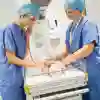





This fully accredited two-year Masters course is suitable for adult nurses on the National and Midwifery Council register that want to develop the skills to become a life-changing midwife.
Your time will be split between learning on placement and within our state-of-the-art Allam Medical Building. You’ll develop the knowledge and confidence to make a difference for mums and their babies at their most vulnerable. And graduate as a qualified midwife.
About this course
With a 50/50 split between clinical practice and scheduled classes, you’ll learn how to support women throughout pregnancy, labour and the early postnatal period.
You’ll learn in some of the UK’s finest facilities within our £28-million Health Campus. Taking part in simulated practice, you’ll develop practical skills in our award-winning clinical learning environment which includes a midwifery-led birthing unit, hospital ward, intensive care unit and resuscitation unit.
We work closely with Hull University Teaching Hospitals NHS Trust. Every semester you’ll get to take a placement in local Trusts and other care environments. This includes the opportunity to experience round the clock care working a variety of shifts.
You’ll develop your understanding of essential theory in lectures, seminars, workshops, enquiry-based learning and self-directed study. Throughout your studies you’ll be supported by midwifery academics, practice educators and mentors. And you’ll graduate as a qualified midwife.

MSc Midwifery
3 mins
Module options
For a full Masters degree, you'll study 240 credits over the duration of your course. Some programmes offer a Postgraduate Diploma (PGDip) qualification or a Postgraduate Certificate (PGCert) qualification. For a PGDip, you'll study 120 credits, and for a PGCert, you'll study 60 credits.
Filters
Fundamentals of Midwifery care
Gain knowledge of the role of the midwife in the childbearing journey. Learn a range of midwifery skills alongside the underpinning theory, and anatomy and physiology.
core
40 credits
Additional skills for midwifery
Learn the underpinning knowledge and skills to assess, recognise and manage ill health, obstetric emergencies and complications in maternity care as part of a multidisciplinary team.
core
40 credits
The Newborn Infant
Exploring factors that predispose the neonate to ill health, you’ll learn to recognise when a baby is becoming unwell, and how to monitor and care for newborn infants.
core
20 credits
Midwifery Practice 2
Build on Practice 1 to become more confident and competent. Contribute to maternity care with guidance and support from midwives in clinical environments.
core
20 credits
Leadership in Practice
Consolidate your knowledge of evidence-based practice, clinical decision making, leadership and management roles within midwifery. You’ll have the opportunity to undertake in-depth study of a subject that is of interest to you.
core
40 credits
Skills for Proficient Practice
Become prepared to practice safely and effectively as a midwife by participating in clinical simulations where team working and interprofessional working are essential. Explore what it means to assume full responsibility for your own midwifery practice.
core
40 credits
Preparation for practice
Learn the skills needed as you make the transition to become a competent, accountable midwife, including supporting students in practice. This module encourages innovation in practice and lifelong learning.
core
20 credits
Midwifery Practice 3
Build on Practice 2 as you become increasingly confident and competent. Become proficient in midwifery practice as you are guided by clinical midwives towards gaining registration.
core
20 credits
Our academics
You’ll be taught by qualified practising midwives and leading researchers who are passionate about making a difference.
Their expertise sees them consult with regulatory bodies and government to drive improvement in healthcare and their research is recognised internationally for its quality.

Louise Lewis
Programme Director for the Short Programme
Louise is a midwifery lecturer and Fellow of the Higher Education Academy. Louise qualified initially as a registered general nurse and worked in medical, surgical and intensive care nursing before returning to study to become a registered midwife.

Lisa Lachanudis
Programme Director for Professional Midwifery Advocate
Lisa is an experienced community midwife and midwife supervisor. Her research interests include women who misuse substances and the impacts of this on childbearing.
Entry Requirements
What do I need?
When it comes to applying for this Postgraduate Taught degree, you'll need an Undergraduate degree (or equivalent). For this course, you'll need a 2:2 from a relevant bachelor's degree.
The programme is designed for graduates who have a studied a subject that is relevant to this course.
If you’re an undergraduate student at Hull, you’re guaranteed a fast-track route to this postgraduate degree, as long as you meet the entry requirements.
In order to ensure our students have a rich learning and student experience, most of our programmes have a mix of domestic and international students. We reserve the right to close applications early to either group if application volumes suggest that this blend cannot be achieved.
Typical offer
2:2 in a relevant subject area
Applicants must have a minimum of a 2:2 Honours degree classification and be an adult nurse live on the NMC professional register.
Fees & Funding
How much is it?
Tuition fees for 2027 entry have not been confirmed. Please use 2026-27 information as a guide.
Scholarships
We offer a number of awards, bursaries and scholarships for eligible students. They’re awarded for a variety of reasons including academic achievement and/or to help those on lower incomes.
Scholarships and bursaries are separate to student loans. And the best bit is, you don’t pay a penny back.
Alumni Postgraduate Scholarship
University of Hull undergraduates progressing to a taught masters course may receive a 20% discount on the cost of their tuition fees.
Find out if you’re eligible by visiting the University of Hull Alumni Postgraduate Scholarship page.
See more Scholarships
We offer a range of scholarships and awards to students at the university to help with their financial load.
To view all of our scholarships and determine whether you're eligible, please visit our Scholarships and Awards page.
Our facilities

Future prospects
We combine classroom learning with practical experience so when you graduate, you’ll be a qualified midwife ready to go straight into a professional health setting.
There’s a strong need for qualified midwives so you’ll graduate with skills that are in demand. Our graduates go onto roles in the NHS, as well as overseas or in private practice.
Take your career to the next level
Like what you’ve seen? Then it’s time to apply.
Make your application online now, and our admissions team will get back to you as soon as possible to make you an offer.
Not ready to apply yet?
We regularly deliver virtual and on-campus events to help you discover your perfect postgraduate course, whether it’s a subject you already love or something completely different. Our events are an opportunity for you to chat to tutors and current students and find out about the career options a postgraduate degree could lead to.
You may also be interested in...
The NHS Learning Support Fund provides a grant of at least £5,000 for each year of study for UK students of a range of undergraduate and postgraduate courses including Midwifery. You don't need to pay this back, and you can get in addition to a student loan. Further details are available on the NHS Business Services Authority
All modules presented on this course page are subject to availability and this list may change at any time.